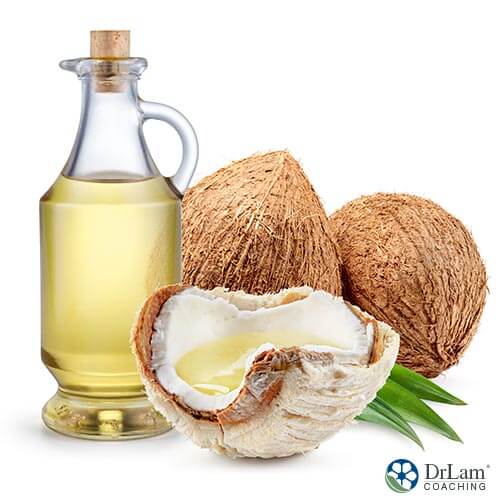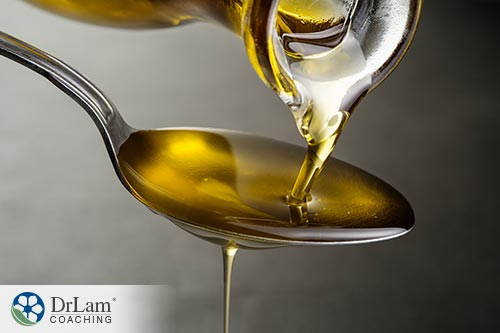 The media has talked a lot about coconut oil lately, claiming that it's the next alternative health miracle. This reputation may not be completely overblown because coconut oil contains caprylic acid, a fatty acid that has a number of benefits for your health and wellbeing. Even better, coconut oil is gentle, and you can use it in a variety of ways, making it adaptable to any lifestyle. You can use it in cooking, skincare, makeup, in the laundry, and even medicinally. If you have Adrenal Fatigue Syndrome (AFS) or just want to benefit your health overall, then this could be a safe remedy for many health problems.
The media has talked a lot about coconut oil lately, claiming that it's the next alternative health miracle. This reputation may not be completely overblown because coconut oil contains caprylic acid, a fatty acid that has a number of benefits for your health and wellbeing. Even better, coconut oil is gentle, and you can use it in a variety of ways, making it adaptable to any lifestyle. You can use it in cooking, skincare, makeup, in the laundry, and even medicinally. If you have Adrenal Fatigue Syndrome (AFS) or just want to benefit your health overall, then this could be a safe remedy for many health problems.
You can apply coconut oil directly to the skin or take it orally. It contains caprylic acid, a fatty acid sometimes called octanoic acid. It contains eight carbon atoms and is a medium-chain triglyceride (MCT). MCTs can be used for energy very quickly as they’re metabolized more like carbohydrates than like fats. This particular fatty acid is also gentle and safe and has several important health benefits. It’s antibacterial, anti-inflammatory, and antifungal and it’s used for:
You can use caprylic acid to address yeast and candida infections. Studies have shown that this fatty acid helps to break down the membranes of candida cells, killing or reducing this type of infection. You can use it for:
One of the most effective ways to use this for oral thrush is through oil pulling, where you swish coconut oil around in the mouth for 10 to 20 minutes before spitting it out.
Digestive issues such as irritable bowel syndrome (IBS) and inflammatory bowel disorder are both associated with inflammation and bacterial infections. Coconut oil is both anti-inflammatory and antibacterial and may help reduce or eliminate these issues.
You need to talk to your doctor before taking coconut oil for digestive issues as it can worsen an upset stomach.
Studies have shown that caprylic acid can lower cholesterol levels and prevent the accumulation of cholesterol in the arteries. This result has been confirmed in further studies, which also show that this fatty acid doesn’t affect HDL or good cholesterol levels.
The antibacterial and antimicrobial properties in the fatty acid in coconut oil can help kill bacteria in the skin and reduce or eliminate skin conditions. This includes conditions like:
 Dermatophilosis (which is caused by a bacterial infection and results in painful scabs).
Dermatophilosis (which is caused by a bacterial infection and results in painful scabs).Coconut oil is used as an alternative remedy for all of these conditions with varying effectiveness. The oil helps to soothe the dry skin and kill the bacterial infections that cause sores and bumps.
Antibiotic resistance occurs when bacteria build up resistance to antibiotics. This means that people and animals can once again be in danger from bacteria that were previously cleared up by antibiotics. Obviously, this is a serious health threat and it’s a growing problem due to the overuse of antibiotics.
Because caprylic acid can kill bacteria without increasing its resistance, it can be used to effectively address certain infections without causing long term side effects for the entire world. As a result, there are some recommendations that this fatty acid is recommended for certain types of bacterial infections.
Some studies suggest that this fatty acid can reduce serum ghrelin levels. This is a hormone produced in the stomach and is responsible for an increased appetite. So, taking coconut oil readily may help to reduce this issue, but further research is needed to confirm these results.
Caprylic acid is found in coconut oil, which can be applied to the skin or taken orally. You don’t need much of this oil to get some benefits. Start out with a tablespoon or less to ensure that your body can tolerate the oil or add it to other foods. It can be taken while solid or liquid and you can even cook with it.
There are also other substances that contain this fatty acid such as palm oil, full-fat cow’s milk, and peanut butter. So, you can try these options if you can’t tolerate coconut oil. Just be aware that their caprylic acid content isn’t as high as it is in coconut oil.
Supplements are also available but should be a last resort as it’s always better to get your nutrients from a natural source. This ensures that you get a balanced assortment of nutrients rather than one in isolation, which usually doesn’t absorb as easily or work as effectively.
If you decide to take supplements, then there is no recommended daily intake at this stage. Start with 500 to 1,000 milligrams three times a day to start with and adjust as necessary.
Coconut oil is safe for most people to use. It doesn’t interact with most medications, but you should still discuss it with your doctor before adding to your diet. Coconut oil isn’t recommended for anyone who:
Coconut oil can also cause allergies, particularly if you have AFS and your system is oversensitive. Make sure you do an allergy test before you apply it to your skin or take orally and don’t take it if you have a coconut allergy.
Also, be aware that coconut oil is high in fat. If you eat more of it to get the benefits of the caprylic acid, then you’re taking in more than 13 grams of fat per tablespoon. This could be a major problem if you already struggle with your diet or have other issues relating to fat intake, so talk to your doctor. You should always consult your doctor before making dietary changes, particularly if you have AFS.
When you’re healthy but stressed, the NeuroEndoMetabolic (NEM) stress response activates to resolve the stress. This prevents your body from being damaged by the harmful effects of stress and causes your body to do into a state of heightened activation. This is what gives you the energy to fight or flee during stressful times, and it’s driven by the release of cortisol from your adrenal glands. High levels of cortisol affect every circuit in your body, changing the way they function as a whole as well as their component parts individually.
When you’re healthy, cortisol levels would drop once the stress has passed and your NEM stress response would go back to normal. But when you experience chronic stress, as too many people do in the modern world, this doesn’t occur. Instead, cortisol levels remain high and the NEM stress response stays in an overactive state. If you don't correct this situation, then you will experience imbalances in the body’s circuits as well as adrenal fatigue. Over time, this can be very damaging. The adrenals can start to degrade and shut down and imbalances throughout the body’s circuits can cause a range of troubling symptoms and problems.
The Inflammation Circuit is part of the NEM stress response. It includes the immune system, the microbiome or bacterial balance in the body, and the gut. This circuit is designed to rid the body of invaders and pathogens that are causing it stress. So, when you’re under stress, it responds by increasing inflammation. When you keep this circuit balanced, any inflammation reduces once the stress has passed. But when you have AFS, this slowdown doesn’t occur and the resulting chronic inflammation can be very damaging.
 When inflammation is rampant throughout your body, you’re at higher risk of cancer, heart disease, and other disorders related to chronic inflammation. That’s why it’s so important that you take steps to correct this issue. The caprylic acid in coconut oil could help with some of these problems, such as:
When inflammation is rampant throughout your body, you’re at higher risk of cancer, heart disease, and other disorders related to chronic inflammation. That’s why it’s so important that you take steps to correct this issue. The caprylic acid in coconut oil could help with some of these problems, such as:
Chronic infections are very common in AFS as the immune system becomes unbalanced and starts to malfunction. That’s why people with AFS often experience colds and cases of flu that won’t go away as well as bacterial infections such as fungus or yeast infections. These will not only leave you feeling lousy, they will also increase inflammation in your body even further and cause more stress, worsening your adrenal fatigue.
Caprylic acid can help to address and reduce infections without strong and potentially harmful medications. This makes it a gentle and effective way to reduce stress and inflammation in the body and help return you to better health.
People with AFS often experience medication intolerances and paradoxical reactions. So, the medications that are meant to correct the infections you’re experiencing may actually make you feel worse. This occurs because AFS causes the immune system to become over-excited and start to react to things that it once tolerated.
This means that you may struggle to get the help you need if you have infections because of AFS. Antibiotics may just make you feel worse, fail to correct the original problem, and increase your stress levels even further. Taking coconut oil regularly is a gentle way to address these problems without causing new ones.
Digestive problems are very common in AFS as the health and balance of the Inflammation Circuit degrade. The gut is an essential component in the creation of inflammation. This is where many inflammatory diseases start and spread to the rest of your body. Increased gut permeability is very common with AFS. This means that the lining of your gut starts to break down and release toxins and other unwanted substances into your bloodstream. Irritable Bowel Syndrome (IBS) and food sensitivities can also cause gut health to degrade, increasing inflammation, and AFS symptoms.
Caprylic acid can help to correct problems like IBS and improve gut health overall by reducing inflammation and infection. This will in turn help to improve your AFS. However, you will need to be careful taking coconut oil when you have AFS, as it can cause digestive upsets, particularly if your system is already sensitive.
Skin conditions like eczema can occur when the body’s immune system starts to attack its own tissues. This is more likely to happen when you have AFS due to immune system dysfunction and overexcitation. If caprylic acid can help to soothe skin conditions, it will lower overall inflammation and help to alleviate stress and adrenal fatigue.
Many people with AFS gain weight for a variety of reasons. This not only makes you feel emotionally bad, which increases your stress levels. It will also put more stress on your body and increase inflammation. By suppressing your appetite and helping you return to a normal weight range, caprylic acid can reduce or eliminate these problems. This will also reduce inflammation and help rebalance your Inflammation Circuit.
 Adding coconut oil to your diet can be an easy way to increase your intake of caprylic acid. This may help to improve your health overall. It may also allow you to eliminate other, less healthy oils that could be damaging your health. If you want to try adding coconut oil to your diet, then here’s how to do it:
Adding coconut oil to your diet can be an easy way to increase your intake of caprylic acid. This may help to improve your health overall. It may also allow you to eliminate other, less healthy oils that could be damaging your health. If you want to try adding coconut oil to your diet, then here’s how to do it:
If you need more information on coconut oil and other easy changes you can make to your diet, the team at Dr. Lam Coaching can help. We offer a free** no-obligation phone consultation at +1-626-571-1234 where we privately discuss your issue. You can also send us a question through our Ask The Doctor system by clicking here.
Caprylic acid is one of the fatty acids found in coconut oil. It can be used in a range of situations such as cooking, cleaning, skincare, and even medicinally. This safe remedy may also help improve your health, reduce your toxic intake, and your adrenal fatigue at the same time.
